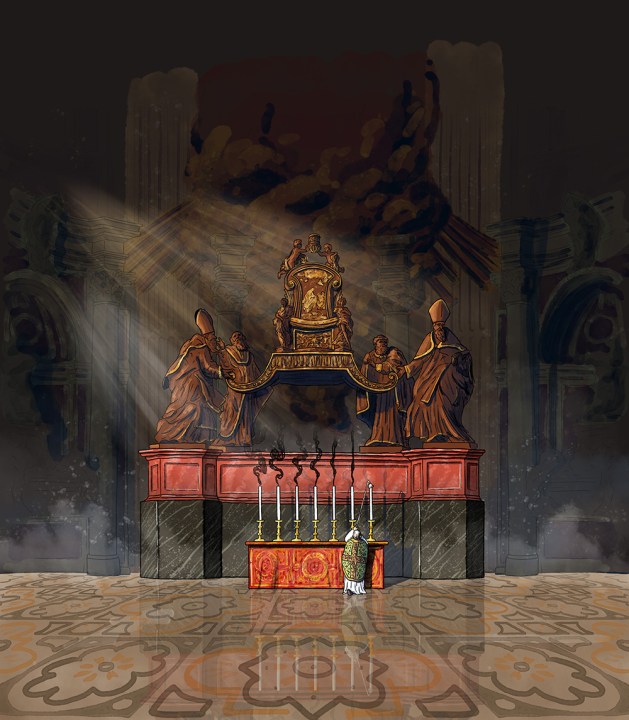
After Francis, what, or rather, who? The coverage so far, rightly admiring of the Pope’s unvarnished, rather un-papal Christianity, has played down how much turmoil he leaves. His openness to all human beings – the poorer, the better – clashed with his old-fashioned, authoritarian, even angry will. Benedict XVI was more traditionalist but much more pacific. There is therefore a case for a conciliatory, transitional candidate. The Church, however, like so many secular institutions nowadays, may be too polarised for that. The liberals, mostly appointed by Francis, dominate the voting cardinals, but lack wide appeal. Liberalism in religion tends towards its own dissolution. The young Catholics starting to swell church numbers once again tend to be conservative.
Thanks to the recent film Conclave, the British have grown used to the idea that an Englishman (preferably Ralph Fiennes) must manage papal elections. Such a person does exist in the not very Fiennes-ish form of Cardinal Arthur Roche, prefect for the Dicastery for Divine Worship and formerly secretary to the congregation. But critics consider him ‘more subtle than any beast of the field’ in suppressing the Tridentine Rite. Besides, he may be a candidate himself. Now that the conclave’s common language is no longer Latin but English, will Roche be the key fixer? Will the Italians, who have not held the job for nearly 50 years, finally concert their power before the number of Europeans (already only 40 per cent) falls even lower? Their most exotic member, Cardinal Pierbattista Pizzaballa, a Franciscan and the Latin Patriarch of Jerusalem, offered himself to Hamas in exchange for all the child hostages. Could he be in with a chance? My favourite (as opposed to the favourite) would be Cardinal Timothy Radcliffe, one of the three voting English cardinals, who is holy and therefore eccentric. The former head of the Dominicans, he has the unusual distinction of having refused a bishopric even though he is a cardinal. But if the white smoke went up for him, he could not avoid being Bishop of Rome.
Everything changes – or should change – because of the Supreme Court’s ruling last week about what defines a woman in law. The Spectator was quite recently reprimanded by Ipso, the regulator, for having published a piece which referred to ‘a man who claims to be a woman’. The person so described complained. Ipso accepted that the words used were accurate, unmalicious, did not constitute harassment and were ‘genuinely relevant to the story’, but nevertheless found they were ‘pejorative or prejudicial’, being ‘personally belittling and demeaning’. Following the rules, the editor, Michael Gove, duly published the adjudication; but he also complained about it in print. Ipso took its stand solely on the point that the complainant ‘felt’ belittled and demeaned by the article. Thus, as Michael Gove puts it, Ipso ‘placed its thumb on the scales in favour of one side in this debate’. This was always the wrong thing for a regulator to do. In the light of the Supreme Court’s ruling, its decision is unsustainable. Or is the Supreme Court itself guilty of ‘pejorative or prejudicial’ expressions?
In Prague last week for a short holiday, I reread Timothy Garton Ash’s We The People, about the glorious year of 1989. He gives his first-person accounts of the four cities in which – partly for The Spectator under my editorship – he reported the end of communism. These were Warsaw, Budapest, Berlin and Prague – the last being the fullest, as Tim, alone among foreign journalists, was holed up with Vaclav Havel in the Magic Lantern theatre as the real-life drama of the Velvet Revolution unfolded. The book, published the following year, is fresh with those events. It reads very well today, despite so much change, conveying how genuine was the longing for liberty and how complete the rejection of the Soviet system. Given the high risks inherent in any revolution, this was truly a good and peaceful one (it was a darker story in Bucharest). It is fascinating to notice two things which barely feature in the book. The first is fear of Russia, which is mentioned, but quickly dismissed, thanks to Mikhail Gorbachev’s determination not to intervene. The other is US support for the revolutions – a sine qua non so completely assumed that Tim scarcely refers to it. His silence is more eloquent than words. Read more than 35 years later, it shows a world we have lost. Now Russia makes war and America seems not to care about the freedom of Europe, which suggests it does not care about freedom anywhere.
‘Watch your step!’ said a notice above a worn stone stair. ‘Uneven historical floor.’ We were in one of the strangest buildings in Prague, the holy house and convent of Loreto. The house bit, built in the early 17th century, is a beautiful version of the House of the Virgin which medieval angels kindly moved from Nazareth to Loreto in Italy to escape the Saracens. The convent surrounds the house and contains many oddities. You encounter the oddest of all as you ascend to the upper floor. Facing a huge, distressingly real effigy of Christ on the cross is a large wall painting of a bearded woman. She too is being crucified, but wearing a beautiful dress, not a loincloth. From her feet falls a golden shoe. My wife, learned in such matters, immediately identified her as St Wilgefortis (or St Uncumber) who refused her father’s order to marry a heathen prince. In return for her earnest prayer, God caused her to sprout a beard overnight, thus putting off the prince and preserving her godly virginity. For her pains, her father put her to death. Dying, she bestowed one of her shoes upon a poor minstrel. Interest in Wilgefortis has nowadays revived elsewhere under the category of ‘queer beauty’, and who is to say that is completely wide of the mark? Yes, history has an uneven floor. If only people remembered that, they might tread more carefully on it.
Who could replace Pope Francis, and what crises await the next pope? Damian Thompson discusses with Fr Alexander Lucie-Smith on the latest Edition podcast:








Comments